Few businesses stand the test of time and survive for over 100 years. There are, of course, several exceptions, and the Judd Paper Company is one of them.
In December 1982, Solomon Worthington and John K. Judd formed the Worthington & Judd Paper Company. The company was formed as a paper manufacturing and paper supply company for other industries. Its early address was a small office at 1 Dwight Street.
The turning point occurred in 1883 when William S. Stedman joined the business. The business relocated to 6 Dwight Street, which has since been renumbered. This is the Perkins Building at the corner of Dwight and Main Street. The company was renamed the Judd Paper Company.
In May 1886, the company leased space on the second floor of the Whiting Street Building at 32 Main Street. In 1887, the company was awarded a contract to supply wrapping paper to the Post Office Department, as it was known at the time.
In 1890, the business was incorporated as the Judd Paper Company. John K. Judd was president, William S. Stedman was the treasurer, and Alfred T. Judd, brother of John K Judd, was the secretary.
In June 1890, Lemuel Sears sold a parcel of land to J. K. Judd adjacent and south of the Sears Building on Race Street. This was a favorable location to build, as it accommodated shipping and receiving, with the branch track of the Connecticut River Railroad running on the canal side of Race Street.
Judd Paper planned to build a 50' by 90' four-story storehouse on the site. The plans were drawn by E. A. Ellsworth. Initially, the contract was awarded to N. L. Cain in February 1891. Ground was broken on February 25, 1891. George W. Richards, ultimately the builder, completed the building.
In December 1891, Judd Paper Company began its move into the Race Street building. Judd Paper Company conducted business and had its showroom on the first floor. Smith and White Company, the early incarnation of White and Wyckoff, operated its business on the upper three floors.
In June 1909, the paper company purchased the neighboring real estate located south of its building, which extended 192 feet to Cross Street. The property was owned by the American Writing Paper Company and occupied by the Holyoke Valve and Hydrant Company. The newspaper account indicated that it understood this was intended for the future expansion of Judd Paper.
Within two days of closing, Judd Paper sold a large portion of this parcel to Holyoke Valve and Hydrant, including 142 feet of frontage to Cross Street. Judd Paper retained 50 feet of frontage for its use in providing additional office space. The former office space would be converted to warehousing. The architect who designed the office building was W. J. Howes.
In 1915, Race Street was renumbered, and the Judd Paper Company building was now addressed at 94-96 Race Street.
On March 4, 1921, the entirety of Judd Paper was destroyed by a fire, which was the largest the city had seen since the McAuslan-Wakelin fire of 1908. The final tally of the company's loss was over $303,000, which in today's (2025) dollars is approximately $5 million.
On March 7, 1921, the company leased 15,000 square feet of space from the American Braid Company, located at the northeast corner of Appleton and Race, to continue its business operations.
In March 1923, architect George P. B. Alderman was selected to design a new building for the company on the site where the fire occurred. Three months later, the Casper Ranger Company was chosen as the building contractor. A permit to build the new $100,000 three-story structure was granted in July 1923, and the new building was completed in April 1924.
John K. Judd, the founder of the business, passed away in December 1929 at the age of 78. At the time, the company employed about 30 employees. The business continued under the leadership of his descendants until the family sold it to Russell J. Smith and William Jolicouer on March 1, 1975. The business name and location remained intact into the late 1990s. In 1999, the firm was reported to have had twelve employees in Holyoke.
Over the years, the company was known for selling fine printing papers. Additionally, it converted office papers, including ledgers and file folders. In the 1970s, the business shifted its focus to supplying industrial packaging, including its Softwrap tissue and Amcraft Optical Envelopes, as well as distributing Molded Pulp Recycled Material. The company expanded into the Midwest, Canada, the Atlantic States, and overseas.
In November 2010, the company was acquired by Multi-Wall Packaging and relocated to a 65,000-square-foot modern manufacturing and warehouse facility in East Providence, Rhode Island, where the Judd Paper Company name continues.
The real estate was sold on February 1, 2012, to 92 Race Street LLC and was subsequently renamed Gateway City Arts, catering to artisans and businesses and serving as a dining and entertainment venue. On July 18, 2024, the real estate was sold to Lighthouse Personalized Education for Teens, LLC for use as a charter school.
The Massachusetts Secretary of State's Office indicates that Judd Paper Company was voluntarily dissolved on December 31, 2012.
Citations:
Newspapers.com (paid subscription): Citations: Holyoke (Massachusetts) Transcript & Transcript-Telegram; Springfield (Massachusetts) Republican; publication dates and pages are shown.
Ancestry.com (paid subscription), Price & Lee City Directories, Holyoke, Massachusetts.
Richard's Atlas of the City of Holyoke, Massachusetts, 1911
Registry of Deeds, Hampden County, Springfield, Massachusetts







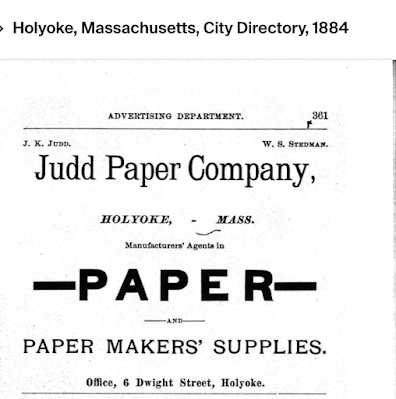








































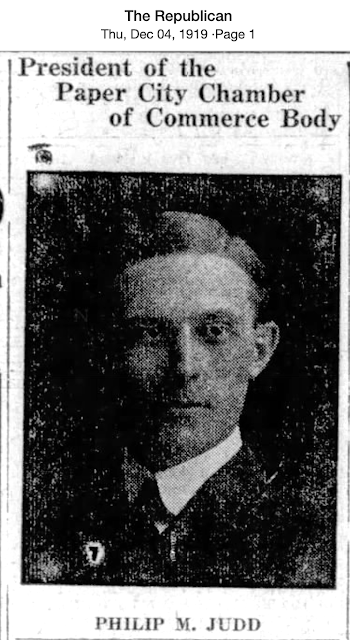
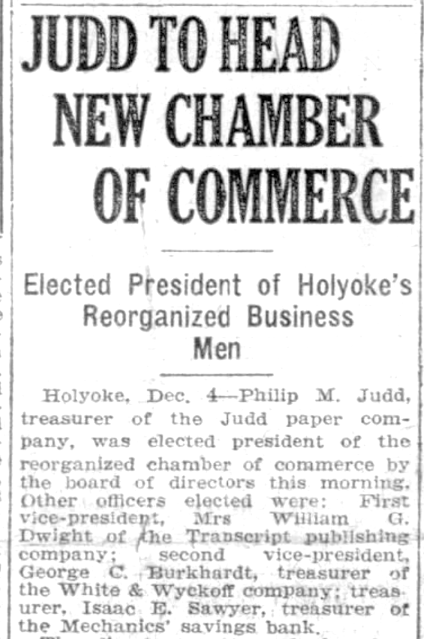

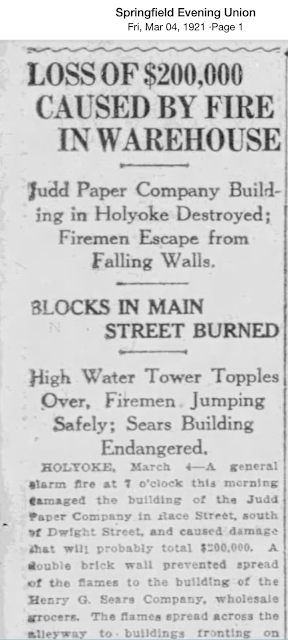

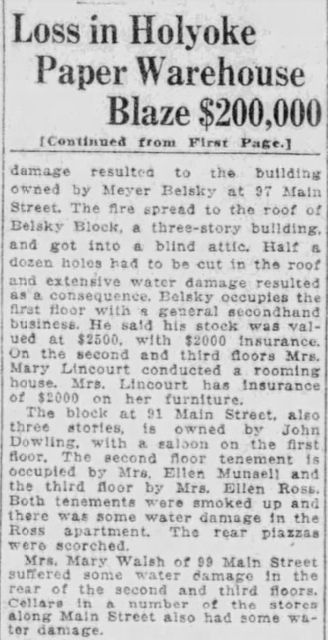







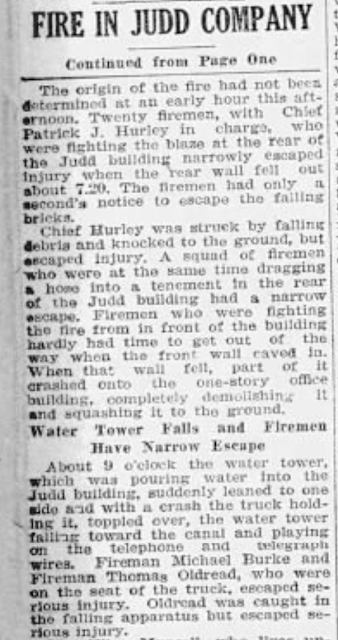












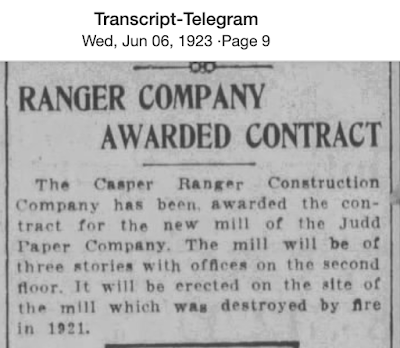







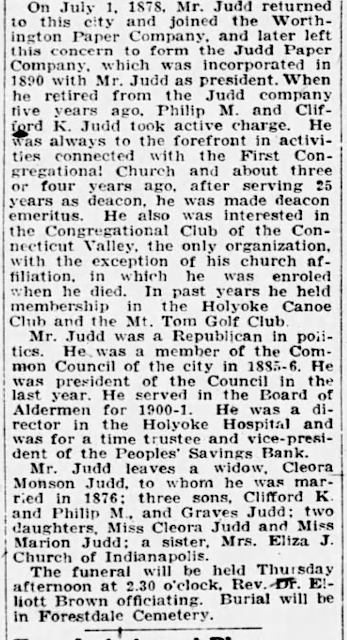













No comments:
Post a Comment